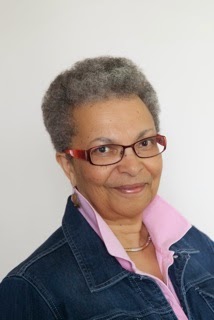by Beth Gibbs
 |
| Beth Gibbs, Age 71 |
What does it mean to have enough? How much food, shelter, clothing, money, health and well-being is enough? And perhaps, more importantly, what does it mean to be enough? The answer will vary from person to person and depend on many factors. For me, fortunately, having enough was not an issue; but being enough was my sticking point and the factors were personal and cultural. In 1980, I was thirty-seven years old, divorced, a single parent with a full-time job in broadcasting and twenty-one credits toward a Master’s degree in communications. Picture that scenario and read the subtitle:
Middle-class, African-American woman/feminist tries to “do it all” and be a “credit to the race” to prove herself competent, capable, connected, and enough.
For those who may not understand the “credit to the race” reference, it’s a term used by many minority groups whose difference in race or ethnicity is an implication that each of us needs to earn respect, not as an individual with distinct talents and skills but on behalf of the whole group, to help dispel or at least not add to stereotypes often held by the majority. That’s a heavy burden and it weighed heavily on my mind.
The cues I was getting from society and my family fed my directives as a woman to “do it all” and as an African-American to be a “credit to the race,” but inside I felt crazy. Underneath my struggling and juggling, I was constipated and stressed. I developed TMJ (temporal mandibular joint dysfunction). There was not enough time, not enough energy, and not enough of me to go around and do all that was expected of me and all that I expected from myself. What to do? I started practicing yoga. First because the postures helped me release and manage stress, and then because I felt yoga doing something else that I could not put my finger on.
By the time 1995 rolled around, I got a glimpse of that “something else” when I began learning about Patanjali’s Yoga Sutras from I. K. Taimni’s book The Science of Yoga. As I read through niyama, the second set of yoga disciplines that lay the foundation of yogic life, I was drawn to sutra 2.42 and immediately recognized that santosha (contentment) was a concept that resonated deeply to my feelings of “not being enough.”
“It is necessary for the aspirant for the Yogic life to cultivate contentment of the highest order because without it there is no possibility of keeping the mind in a condition of equilibrium.”
I figured if I could cultivate a sense of contentment, maybe I could recognize or create an internal sense that who I was, was enough. Tall order but worth working on. Fast forward to 2002. By this time, I realized that I could not “do it all’”without risking my health and my sanity. I had given up the business suits and heels, along with several committee and board positions. And, yes, as a result, external validation from a number of people and organizations melted away like cold butter on a warm summer sidewalk. I was still struggling with the “credit to the race” directive but had begun questioning what that really meant. Did I truly need to fit someone else’s image of what that was or looked like? Could I be a “credit to the race” and still be me? I didn’t know but I felt myself inching closer to santosha and that was a huge payoff in my mind.
It was a yoga weekend in New York’s Catskill Mountains when the concept of santosha shifted from an intellectual idea to a cellular understanding. I was in the middle of a sweat-popping Sun Salutation strength series, struggling to hold up my body’s weight on one foot and one hand in Side Arm Balance.
“Hang in there,” said the teacher. “Breathe. Feel your power. Let me hear some deep sighs.” I sighed and hung in. Next came alternate leg lifts and Locust pose. I followed along carefully, feeling how much my spine had loosened up over the years. Glued to the ground from chin to pelvis, I inhaled both my legs off the ground and felt them “float up.”
“This is a powerful strengthener for the back,” said the teacher, “so squeeze that butt. A few groans and sighs would feel good about now.” My legs ached with the effort but I groaned and sighed and squeezed and held just a bit longer than I thought I could before lowering them. At last Savasana!
“Just let yourself blob out on the ground and feel the energy circulate.” Her voice was soft, soothing and very musical. “Welcome the benefits of the universe. Feel yourself melt into the ground. Breathe deeply. Inhale through the head; roll the breath down the body. Exhale it out through the toes. Relax.”
Being away from home with all family and work responsibilities postponed, I found myself, in that moment, floating somewhere between here and there at the same time. Grace, surrender and santosha! In The Secret Power of Yoga, Nischala Joy Devi, comments on Sutra 2.42:
“When at peace and content with oneself and others (Santosha), supreme joy is celebrated. By this affirmation, we firmly identify with our inner essence rather than with external objects. Our identification then travels with gratitude, appreciating how much we have rather than how much we want.”
It was a long process but when I look back, I realize that it took 37 years for the threads of external directives, striving, and “not enough” to tie themselves into knots big enough to feel. So, does it really matter that it took another 35 years to untie the knots and let the threads dissolve? Nope. In the end, the only thing that matters is that through yoga, I found the discipline to work the issue through moment-by-moment, bit-by-bit, and thread-by-thread.
Today at 71, I’m a lot better at managing stress. I haven’t been constipated in years. My TMJ bite plate gathers mildew on the top shelf of the medicine cabinet. And my daily yoga practice is as important to me as breathing. Of, course, the physical practice does not look like it did in 2002. Pranayama and meditation make up a larger percentage. My physical practice varies depending upon my needs for the day. Sometimes it’s stronger—I love Plank poses! And sometimes it’s slow, flowing Sun Salutations or 10 minutes in Legs-up-the-Chair pose. I rejoice in the fact that underneath the “African,” underneath the “American,” and underneath the “woman,” is a being who can occasionally and surprisingly “be here now” and be content. In those moments, I can rest amid chaos and be present in the midst of my life with all its joys and problems. I can experience this and me at the same time. I am competent, capable, connected, and a credit to universal consciousness in all its forms. And that is enough.

Beth Gibbs, MA, E-RYT 500, is a certified yoga therapist through Integrative Yoga Therapy. She is a senior member of the IYT teaching faculty and directs the school’s Professional Yoga Therapist Internship Program. Beth has a Masters degree in Yoga Therapy and Mind/Body Health from Lesley University in Cambridge, MA, and has served on the Educational Standards Committee for the International Association of Yoga Therapists. Her website is: proyogatherapeutics.com.
Follow Yoga for Healthy Aging on Facebook ° To order Yoga for Healthy Aging: A Guide to Lifelong Well-Being, go to Amazon, Shambhala, Indie Bound or your local bookstore.


Wonderful sharing – thank you Yoga for Healthy Aging
Just. WOW. So inspirational. I am a 57 year old woman with a less than year old yoga practice. Just what I needed to hear today. Thanks!
Being cognizant of the outer package of being a 50 year old white female, I long for the day when race is not how we see ourselves or each other, save for the human race. I love your story! Know that you probably lead the charge for many people to be authentic in their lives as they witnessed you step into yours. As you healed, we healed right along with you. xo
You da bomb Woman!
I too grew up with the expectation that my behavior, as a black person was not going to reflect not just on me but all other African-Americans. I often heard you have to be "a credit to your race"–interchangeable with "be an example for the race". If my behavior was positive then perhaps whites would view other Blacks favorably, but if it was negative then it would reinforce any negative stereotype that white person had about Blacks. One example (and this is a small one) my grandmother would not let me wear jeans with holes in them when they were in style because she said "people will see you and think you don't know how to dress or how to wear your clothes". When would I ever be good enough and when could I just be me? Yoga has been a profound influence in my life. I came to it as a 47 year old not very fit woman with IBS, asthma, excema, bunions with foot orthotics and tmj also. All stress induced or exacerbated by stress. Now, going on 8 years later I have rare flare-ups of my stress issues and yoga has helped me to become at ease in my own skin. I was always enough–the yoga has helped me to realize and feel being enough. This is a great article and resonates so deeply with me. Thank you so much Beth. Blessings.
Very inspirational.
Lovely thanks for sharing, as an 'old Irish american white guy'I can relate to everything said here!
This is a lovely reminder of how much we can learn at any age. I have been lax with my practice when I dropped out of a costly gym membership, but your words have been a catalyst to re-start. Thank you. Diane
As an old white American in a foreign country for over 30 years, I too can relate to trying to be enough and defending or upholding my beliefs. I may one day get closer to just being who I am and being content. I gave up my gym membership too and have tried to do yoga at home amongst the work and home schedule and find I lack the discipline. This has inspired me to do more. Thank you.
What a wonderful inspiring post!. Thank you